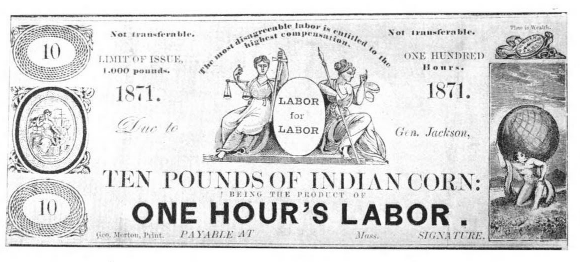
PREV ARTICLE
NEXT ARTICLE
FULL ISSUE
PREV FULL ISSUE
JP KONING ON STIGMATIZED MONEYJP Koning blogs about money and economics. I've missed some of his recent posts but have been wanting to mention this August 5th article about "Stigmatized money" - forms of payment that aren't universally accepted and are looked down upon by other parts of society. We've discussed some of these payment forms before and I've added links to earlier E-Sylum articles. -Editor
Some payments systems are so awkward they scare away the average user. The only people with the patience to stick around must have a motivation for doing so. These include ideologues with an ax to grind, hobbyists who happily embrace complicated features, and criminals/weirdos who are shut out of everything else. Here are a few examples of awkward payments systems: -Local Exchange Trading Systems, or LETS
When usage of a payments system is confined to a narrow group of like-minded individuals, this may stigmatize these systems, scaring away mainstream users. Stigmatization only compounds the initial awkwardness. After all, if fewer venues accept the stigmatized payments option then it becomes harder for the small band of users to make purchases. A vicious circle has been created. Initial awkwardness leads to stigma which leads to more awkwardness etc. While this vicious circle is the death knell for a payments system, it is less of a problem for other products. You can make a decent living by targeting a small niche of consumers, say communists who eat vegan food. Every big city needs a communist vegan restaurant. But a payments network is only as good as the size of the payments pathways that it facilitates. A payments entrepreneur won't get very far by building a platform that only allows communist vegans to pay other communist vegans. How to evade the awkwardness-stigma spiral? What is needed is a frictionless, non-awkward payments system. With little to learn, everyone—not just nerds and those with an ax to grind—can quickly start using it. Think M-Pesa or Visa or Octopus. Even the haters will get onboarded. Gold bugs and bitcoiners may rail against banks and fiat money. But because everyone else is using these relatively simple systems, the bugs and the bits have no choice but to go along. By bringing the vast hoard of normies on board along with the weirdos, these systems avoid all connotation. They are safe for broad consumption. No stigma can attach to them. And so the vicious awkwardness-stigma circle I described gets sidestepped. To read the complete article, see:
Local Exchange Trading Systems, or LETS
To read the referenced LETS article, see:
To read earlier E-Sylum articles, see:
Bitcoin/Dogecoin
This subset has developed its own norms and codes. Bitcoin steak dinners are a good example. A large group of predominately male bitcoiners will get together to eat meat while avoiding vegetables, then broadcast it on Twitter... I'm sure it's a lot of fun. But these sorts of traditions will inevitably be perceived as weird by the majority. And so the majority will go out of their way to avoid bitcoins for fear of being tarred as an oddball. Other niche groups who can't sympathize with male carnivores, say lesbian vegans, will avoid bitcoin payments on principal. This stigma cuts down on the potential pool of bitcoin payees, which only makes bitcoin more annoying to use. Mastercarders don't have their own set of traditions. For instance, you won't see Mastercard users setting up meetups to eat organic food and talk about the latest development in tokenization technology. The Mastercard/Visa user-bases are devoid of culture and character. This lack of a class consciousness is one of the features that makes them such effective payments networks. Systems without norms and traditions never face the risk of falling into the stigmatization hole. Facebook's Libra has attracted plenty of attention over the last few months. But Libra risk encountering the same awkwardness-stigma cycle as Bitcoin and LETS. Unlike other social media-based payments tools (Wechat, Kakao, Line etc), Libra's architects have chosen to create a new unit of account rather than marrying Libra tokens to existing units like the dollar or euro. Cash
Konig notes that we're already starting to see this cycle ramping up against the use of cash. -Editor
The vicious awkwardness-stigma cycle has already started to hit cash. In places like Sweden, cash is being stigmatized. When the middle and upper class are convinced that only the poor and criminals use coins and banknotes, many of them will go out of their way to avoid using cash. Cash becomes "grungy and unsexy," as Brett Scott puts it. Unfortunately, an ever narrower base of cash users will only make the stuff more expensive for retailers to handle, leading to a rise in cashless stores (especially ones that cater to the rich), leading to more awkwardness and stigma, leading to less users, etc. David Birch has an interesting parable from William Gibson's Count Zero that illustrates what happens when this stigmatization is brought to its logical conclusion. Basically, cash is still around in Gibson's imagined future, but it has disappeared from "polite society". And so the story's protagonist, Bobby Newmark, describes it as unspendable... 
To read earlier E-Sylum articles, see:
Labor notes
Labor exchange notes were only mentioned in passing, but are a recurring theme in economic history and popular collectibles today. I have several in my collection. See my Numismatic Diary elsewhere in this issue for a couple more American Labor Exchange notes. -Editor


To read earlier E-Sylum articles, see:
To read the complete article, see:

Wayne Homren, Editor The Numismatic Bibliomania Society is a non-profit organization promoting numismatic literature. See our web site at coinbooks.org. To submit items for publication in The E-Sylum, write to the Editor at this address: whomren@gmail.com To subscribe go to: https://my.binhost.com/lists/listinfo/esylum All Rights Reserved. NBS Home Page Contact the NBS webmaster 
|